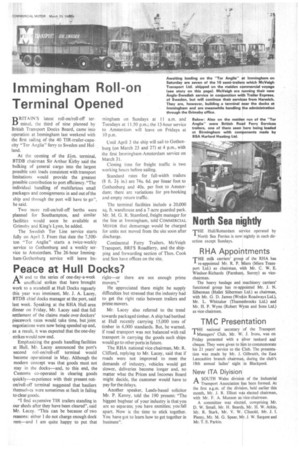Peace at Hull Docks?
Page 27

If you've noticed an error in this article please click here to report it so we can fix it.
AN end to the series of one-day-a-week
unofficial strikes that have brought work to a standstill at Hull Docks reguarly this year was imminent, Mr. 3. A. Lacey, BTDB chief docks manager at the port, said last week. Speaking at the RHA Hull area dinner on Friday, Mr. Lacey said that full settlement of the claims made over dockers' piecework rates would take time, but joint negotiations were now being speeded up and, as a result, it was expected that the one-day strikes would now end.
Emphasizing the goods handling facilities at Hull, Mr. Lacey announced the port's second roll-on/roll-off terminal would become operational in May. Although the modern concept was that goods must not stay in the docks—and, to this end, the Customs co-operated in clearing goods quickly—experience with their present rollon/roll-off terminal suggested that hauliers themselves were sometimes at fault in failing to clear goods.
"I find expensive TIR trailers standing in our sheds after they have been cleared", said Mr. Lacey. "This can be because of two reasons: either I do not charge enough dock rent—and I am quite happy to put that right—or there are not enough prime movers."
He appreciated there might be supply difficulties but stressed that the industry had to get the right ratio between trailers and prime movers.
Mr. Lacey also referred to the trend towards packaged timber. A ship had berthed at Hull recently carrying 15,000 tons of timber in 6,000 standards. But, he warned, if road transport was not balanced with rail transport in carrying the goods such ships would go to other ports in future.
The RHA national vice-chairman, Mr. R. Clifford, replying to Mr. Lacey, said that if roads were not improved to meet the demands of industry, vehicles would get slower, deliveries become longer and, no matter what the Prices and Incomes Board might decide, the customer would have to pay for the delays.
Another speaker, Leeds-based solicitor Mr. P. Kenny, told the 190 present: "The biggest bugbear of your industry is that you are so separate; you have enmities; you fall apart. Now is the time to stick together. You have got to learn how to get together in business".




















































































































